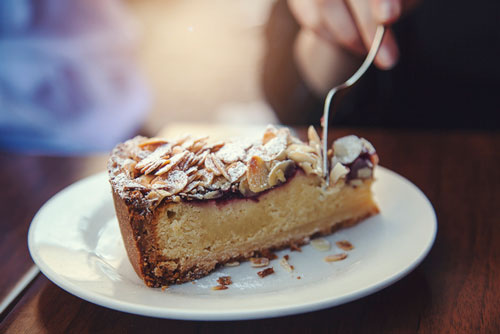The traditional meal is a well-worn ritual… First, you eat a salad or perhaps soup. Then you move to the main course. After that, you have dessert.
It seems to make sense that this meal structure is ideal if you are on a diet. You could fill up with salad. That would help you eat less of the main course. And since dessert comes at the end of the meal, you might be full enough to resist the usual sweet, calorie-laden treat.
New research found it doesn’t work that way.
The study was done at the University of Arizona in Tucson.[1]
We know that portion size makes a difference to how much we’ll eat. Researchers said they wanted to know how it might affect eating habits “if an indulgent option was placed at the beginning, instead of the end, of a food sequence.” They also wondered if this would affect caloric intake. In other words, they wanted to see what happens when you eat dessert first.
The research team ran four experiments. One took place in a college cafeteria. The other three involved a fake food delivery website.
One thing cafeterias and food delivery website menus have in common is that they put desserts last. For the experiments, researchers put a selection of either healthy or unhealthy (high calorie) desserts at the start of the cafeteria line. They put the healthy/unhealthy desserts at the top of the website menus. Then they switched and put the desserts at the end in both situations.
The bottom line?
People who picked a less healthy, indulgent dessert first ended up choosing lower calorie main courses and side dishes. And they ended up consuming 161 fewer total calories on average compared to people who had a sugary, fatty dessert last.
It only worked with the indulgent dessert, though. People who ate a healthy dessert first actually ended up consuming more calories than those who ate it last. And more on average than people who had the indulgent dessert first or last.
Professor Martin Reimann was the study’s lead author. He said, “We believe diners who chose the indulgent dessert first picked healthier main and side dishes to make up for their high-calorie dessert.”[2]
Don’t Shy Away From an Indulgent Dessert
Try eating dessert first. If you’re like the people in the study, you’ll eat far fewer total calories.
If you eat 500 fewer calories a day, that means you’d lose about a pound a week. That’s over 50 pounds a year. And you’ll never again have to deny yourself dessert.[3]
Editor’s Note: Learn how you can shed pounds of body fat—without cutting back on the foods you love.
Discover how to unlock your fat-burning potential HERE.
Related Articles
Scientists Swear by This Weight Loss Trick
The 5 Foods You Need for Easy Weight Loss
Weight Loss Drug Breakthrough? Don’t Believe It
[1]https://www.apa.org/images/xap-xap0000210_tcm7-251525.pdf
[2]https://www.medicalnewstoday.com/articles/324650.php
[3]https://www.mayoclinic.org/healthy-lifestyle/weight-loss/in-depth/calories/art-20048065

